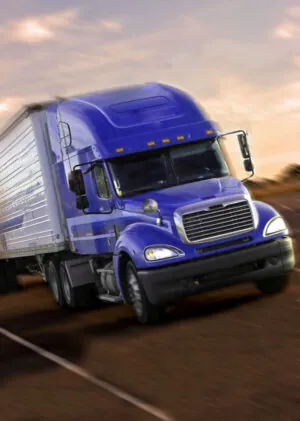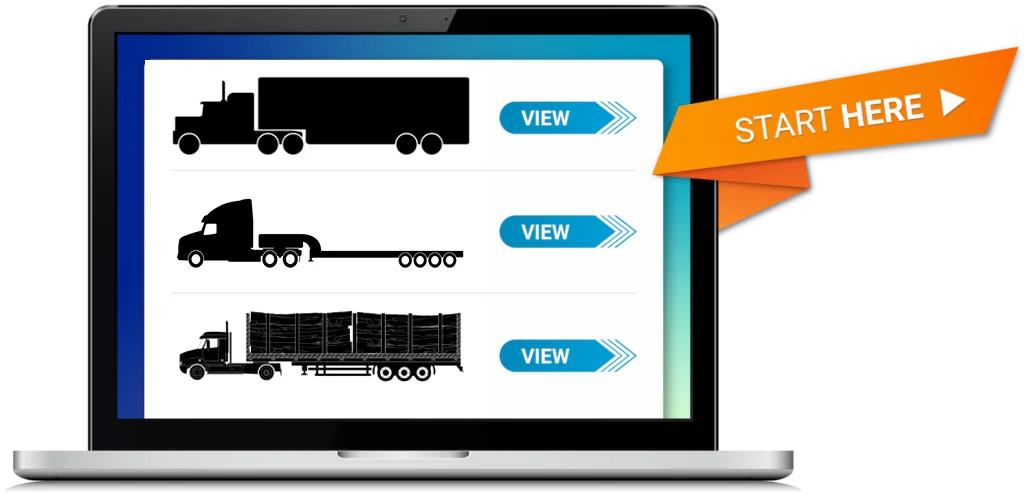Truckload Freight Services
Get Reliable, Cost-Effective FTL Shipping from a Trusted Logistics Partner
FreightCenter connects shippers with a national network of vetted truckload freight carriers. Whether you're shipping a single full truckload or managing a high-frequency shipping operation, our platform makes it easy to compare rates, book shipments, and track deliveries.
Explore More FreightCenter Shipping Solutions
Freight Shipping Services Freight Quote Tool Shipment TrackingReliable, Affordable Full Truckload Freight Services
FreightCenter makes shipping large-volume cargo simple, secure, and stress-free. Whether you’re moving standard palletized freight, oversized items, or temperature-sensitive products, we have you covered. Instantly access competitive rates from our extensive network of trusted carriers and benefit from expert logistics support explicitly tailored to your unique shipping requirements. Let FreightCenter simplify your truckload freight process, providing peace of mind and efficiency at every step. Start streamlining your freight shipping experience today.
Thousands of businesses trust FreightCenter to move their freight faster, smarter, and cheaper! From unbeatable rates to top-notch service, our customers are raving about their shipping success.
See why they keep coming back!
Award-Winning Service, Trusted by Shippers Everywhere!
- 2021, 2017 & 2016 Food Logistics’ Top Green Providers
- 2021 & 2018 Supply & Demand Chain Executives’ Pros to Know: Matthew Brosious
- 2020 & 2019 Top Food Logistics’ 3PL & Cold Storage Provider Award
- 2020 & 2019 Business Observer’s Top 500 Companies on the Gulf Coast
- 2020 & 2017 SmartWay® Transport Partner
- 2020 & 2017 Food Logistics’ Champions: Rock Stars of the Supply Chain
- 2020 Best of Palm Harbor Awards for Local Businesses
- 2017 Green Supply Chain Award from Supply & Demand Chain Executive
- 2017 Tampa Bay Business Journal Heroes at Work
- 2016, 2015, & 2012 Food Logistics Top 100 Software and Technology Providers
- 2013 Tampa Bay Business 100 by Tampa Bay Business Journal
- 2013 Top 100 Great Supply Chain Partners by SupplyChainBrain
- 2012 TIA Samaritan Award Honorable Mention
- 2012, 2011 & 2010 TBBJ Fast 50 Recipient
- 2013, 2011, & 2010 Diversity Business Top Businesses

Why Choose FreightCenter for Truckload Shipping?
FreightCenter offers unparalleled convenience and reliability in truckload shipping. When you partner with us, you gain access to our extensive nationwide network of thoroughly vetted carriers, ensuring your cargo is handled by trustworthy and dependable professionals. We provide immediate access to competitive rates from leading truckload providers, enabling you to quickly compare and select the most cost-effective shipping option for your needs. Our dedicated freight experts are always available, providing personalized support to manage and optimize your shipments from start to finish efficiently.
Experience You Can Trust
With over 26+ years in freight logistics, FreightCenter has helped thousands of businesses simplify their shipping and reduce costs. Our experienced freight agents are here to guide you through every step — from quote to delivery.
AI-Driven Carrier Matching
We use advanced AI-powered algorithms to instantly match your shipment with the most optimal carriers from our network of over 20,000 trusted providers. This ensures you’re always getting the best combination of price, service quality, and transit time.
Unmatched Carrier Flexibility
Our expansive network includes national, regional, and specialty full truckload (FTL) carriers, providing you with flexibility whether you’re shipping across town or cross-country. From dry vans to heavy haul and hazmat, we’ve got you covered.
All-in-One Freight Platform
Compare quotes, book shipments, and track deliveries in real time — all through FreightCenter’s intuitive online platform.
Personalized Service with a Human Touch
Technology drives our platform, but people power our service. Every customer gets access to a dedicated freight expert who understands your business and finds solutions tailored to your needs.
What Are Truckload Freight Services?
Truckload freight services — also known as FTL shipping — involve using an entire truck to move one shipper’s freight. This is ideal for large shipments that:
-
Fill an entire trailer (usually 48’ or 53’)
-
Are time-sensitive and need a direct route
-
Require special handling or security
At FreightCenter, we simplify FTL shipping by giving you access to:
-
Top-rated national and regional carriers
-
Transparent, competitive pricing
-
End-to-end shipment visibility
-
Dedicated freight agents
Each shipment is different. That’s why we offer customized truckload solutions for every freight need.
FreightCenter connects shippers to trusted carriers offering enclosed dry van trailers for general
Our carrier network includes temperature-controlled trucks to move perishable items like produce, dairy, pharmaceuticals, and more—safely and on time.
FreightCenter’s flatbed FTL solutions support oversized and irregularly shaped cargo, ideal for heavy equipment, lumber, and construction materials.
When your freight is too tall for a standard flatbed, FreightCenter offers step deck trailers that allow for higher clearance and safe transport.
For extremely tall loads like industrial equipment, we provide double drop deck trailers with a low central well for maximum height flexibility.
FreightCenter can arrange RGN trailers for freight that needs to be driven directly onto the trailer—commonly used for construction, oilfield, and agricultural machinery.
We offer Conestoga trailers—flatbeds with retractable tarping systems—for freight that needs side loading and protection from weather without the need for shrink wrap.
Need your freight fast? FreightCenter offers expedited FTL shipping with team drivers and priority service to meet tight deadlines.
FreightCenter partners with certified hazmat carriers to handle shipments of chemicals, batteries, flammables, and other regulated materials safely and legally.
Our logistics experts coordinate heavy haul shipments requiring special permits, escorts, and equipment—perfect for large-scale industrial freight.
If you already own or rent your trailers, FreightCenter can provide power-only capacity—tractors and drivers to move your freight efficiently.
FreightCenter helps high-volume shippers secure dedicated equipment and drivers for consistent lanes, exclusive routes, or specialized freight needs.


Industries We Serve for Successful Truckload Shipping
At FreightCenter, we offer truckload freight services tailored to the specific needs of industries nationwide. Whether you’re moving raw materials, finished goods, or time-sensitive products, we have the carrier network and logistics expertise to deliver with precision.
Our FTL solutions support:
-
Manufacturing
Keep production moving with just-in-time delivery of components and outbound shipments. -
Retail & Distribution
Ensure store shelves and fulfillment centers stay stocked with reliable truckload delivery. -
Agriculture & Foodservice
Move fresh, frozen, and dry goods safely with temperature-controlled and time-sensitive FTL options. -
Automotive
Transport parts, equipment, and vehicles efficiently to keep supply chains running smoothly. -
Pharmaceutical & Healthcare
Secure, compliant truckload shipping for medical supplies, equipment, and regulated items. -
Energy & Construction
Deliver oversized freight, machinery, and heavy materials to job sites across the U.S.
Frequently Asked Questions About Truckload Freight
Q. What makes FreightCenter’s truckload freight services different from other providers?
Truckload freight shipping (also called FTL) refers to using an entire trailer to move a single shipper’s freight. It’s ideal for large-volume shipments that need direct, secure, and fast delivery.
Q. How does truckload differ from LTL shipping?
FTL shipping utilizes a dedicated truck for your freight, whereas LTL shipping consolidates shipments from multiple shippers onto a single trailer. FTL is faster, with less handling and lower risk of damage.
Q. How much does truckload freight shipping cost?
FTL costs vary based on distance, equipment type, weight, fuel rates, and market demand. Use our freight rate calculator to instantly compare rates from over 100 carriers.
Q. How long does Full Truckload shipping take?
Most FTL shipments take 1–5 business days, depending on the distance, route, and service type (standard or expedited). Expedited truckload services offer guaranteed delivery windows.
Q. What equipment types are available for truckload freight?
We offer a wide range of FTL options, including dry vans, reefers, flatbeds, step decks, RGNs, Conestogas, and more.
Q. How big does a shipment need to be for FTL?
Generally, shipments weighing more than 15,000 pounds or containing more than 10 pallets qualify for full truckload freight. If you’re unsure, a freight expert can help match you with the right service.
Q. Can I track my truckload shipment in real time?
Yes. FreightCenter provides real-time tracking and shipment updates from pickup to delivery.
Q. Is truckload freight shipping available nationwide?
Yes. We provide nationwide FTL service, including regional, cross-country, and cross-border routes across all 50 states.
Q. Can I schedule a specific pickup time?
Most FTL carriers offer flexible pickup windows, and time-critical shipments can be scheduled with narrow pickup and delivery windows if needed.
Q. Do you offer expedited truckload freight services?
Yes. Our expedited truckload options include team drivers and guaranteed transit times for urgent deliveries.
Q. What types of freight can I ship via FTL?
FTL is ideal for bulk commodities, machinery, packaged goods, construction materials, oversized freight, and temperature-sensitive products.
Q. Do I need a dock or forklift for truckload shipping?
Typically, yes. If you don’t have one, we can arrange for liftgate service to assist with loading and unloading.
Q. Are FTL shipments insured?
Yes. Basic liability coverage is included, and we offer freight insurance for added protection, especially for high-value cargo.
Q. Can I ship hazardous materials via truckload?
Yes. We work with hazmat-certified carriers and ensure all regulatory documentation and labeling are handled properly.
Q. What is a power-only truckload service?
Power-only means we provide the tractor and driver while you supply the trailer. It’s ideal for trailer pools, drop-and-hook operations, or pre-loaded freight.
Q. What’s the difference between dry van and flatbed FTL?
Q. Do you offer dedicated truckload services?
Yes. Dedicated FTL services provide a truck exclusively for your freight, ensuring faster, secure, and uninterrupted delivery.
Q. Can I ship temperature-controlled truckload freight?
Absolutely. Our reefer truckload services are perfect for frozen foods, fresh produce, pharmaceuticals, and other perishable items.
Q. How do I get a truckload freight quote?
Just fill out our online FTL quote form to instantly compare truckload rates from multiple carriers.
Q. Why should I choose FreightCenter for truckload freight services?
FreightCenter combines over 25 years of experience, a network of more than 20,000 carriers, AI-powered rate matching, and expert logistics support to deliver dependable, cost-effective truckload freight services.
3 Amazing Things You Never Knew About Truckload Freight Services

1. You Don’t Need to Own a Truck to Ship Like a Pro
With platforms like FreightCenter, anyone — from small businesses to enterprise shippers — can access 20,000+ carriers and book full truckload shipments without managing assets or contracts. It’s logistics-as-a-service, and it's revolutionizing how companies ship freight.

2. AI Can Actually Save You Thousands on Every Load
FreightCenter uses AI-powered carrier matching to analyze routes, rates, fuel surcharges, and transit times — automatically connecting you to the most cost-efficient option. What used to take hours of phone calls now happens in seconds, and your bottom line thanks you.

3. Truckload Freight Isn’t Just for Massive Companies
Think FTL is only for Fortune 500s? Think again. If your shipment fills 10+ pallets or weighs over 15,000 lbs, FTL is often cheaper, faster, and safer than LTL. FreightCenter helps thousands of growing businesses ship smarter with truckload freight every day.


